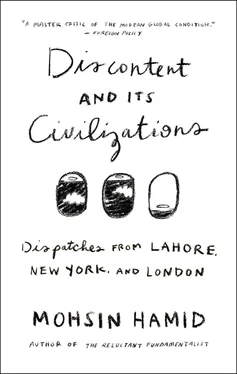Most of the essays in this book — including noteworthy pieces by Sana Haroon, Shah Mahmoud Hanifi, and Faisal Devji — come across as challenges, intent on debunking popular myths. In his essay on the Red Mosque in Islamabad, which was raided by the Pakistani government in 2007, for example, Devji argues that it does not make sense to compare the aggressive activists of the Red Mosque with the Taliban and al-Qaeda. Many of the Red Mosque’s practices that Devji cites are unknown among the Taliban, such as the involvement of women and their deployment as activists “shoulder to shoulder” with men. The experience of reading Under the Drones may, for many readers, be one of constantly losing their footing, as they realize that the assumptions on which their views are grounded have only tenuous basis in fact. It is a feeling that, over the past dozen years, US military planners in the region will have come to know well.
—
AS DRONE WARS continue in Africa and Southwest Asia, we ought to remember that Western governments can be dangerously ignorant of these other regions. US policymakers are looking for a new approach to fighting terror after sustaining thousands of casualties in Iraq and Afghanistan. Drones do not expose their operators to the risk of physical harm and avoid the need for the large and costly deployments of troops with which the US public has grown weary.
So a widening and covert campaign heavily involving drone strikes might seem an attractive option. Already, the intensifying pace of strikes in Yemen (twenty-three in the second half of 2012) is on the verge of overtaking the reduced campaign in Pakistan (twenty-four in the same period). US drones have struck in Somalia, and there are plans to establish a base for US drones near Mali.
Yet to imagine that drone strikes are a panacea is to draw overly simplistic lessons from the wars of the past dozen years. Whatever the merits of toppling cruel and justifiably hated dictatorships in Iraq and Libya, these countries and their neighbors are today probably of more concern from the perspective of international terrorism than they were before.
Each country and region is different. But some states in Asia and Africa are trying to make transitions to democracy after years of despotic rule. During these transitions, they will often be weak. We ought, therefore, to reflect on the fact that strong states police themselves better than weak states. When states have elected governments, as is the case in Pakistan, and if the US drone strikes are unpopular, as they naturally are, the governments are likely to be made weaker, not stronger, by them. Few foreign military campaigns remain popular with locals for long.
Strengthening such countries will therefore depend on support for the complicated and unique internal political processes that can build in each a domestic consensus to combat extremists — who, after all, typically kill more locals than they do anyone else. International pressure and encouragement can help secure such a consensus. But it cannot be dispatched on the back of a Hellfire missile fired by a robot aircraft piloted by an operator sitting halfway around the world in Nevada.
(2013)
IN 2007, six years after the terrorist attacks of September 11, 2001, I was traveling through Europe and North America. I had just published a novel, The Reluctant Fundamentalist , and as I traveled I was struck by the large number of interviewers and of audience members at Q&A’s who spoke of Islam as a monolithic thing, as if Islam referred to a self-contained and clearly defined world, a sort of Microsoft Windows, obviously different from, and considerably incompatible with, the Apple OS X — like operating system of “the West.”
I recall one reading in Germany in particular. Again and again, people posed queries relating to how “we Europeans” see things, in contrast to how “you Muslims” do. Eventually I was so exasperated that I pulled my British passport out of my jacket and started waving it around my head. “While it’s true the UK hasn’t yet joined the eurozone,” I said, “I hope we can all agree the country is in fact in Europe.”
Six years on, a film inspired by the novel is in the process of appearing on screens around the world, and I am pleased to report that those sorts of questions are a little rarer now than they were in 2007. This represents progress. But it is modest progress, for the sense of Islam as a monolith lingers, in places both expected and unexpected.
Recently I was told by a well-traveled acquaintance in London that while Muslims can be aggressive, they are united by a sense of deep hospitality. I replied that I remembered being in Riyadh airport, standing in line, when a Saudi immigration officer threw the passport of a Pakistani laborer right into his face. If that was hospitality, I wasn’t sure we had the same definition.
Islam is not a race, yet Islamophobia partakes of racist characteristics. Most Muslims do not “choose” Islam in the way that they choose to become doctors or lawyers, nor even in the way that they choose to become fans of Coldplay or Radiohead. Most Muslims, like people of any faith, are born into their religion. They then evolve their own relationship with it, their own individual view of life, their own micro-religion, so to speak.
There are more than a billion variations of lived belief among people who define themselves as Muslim — one for each human being, just as there are among those who describe themselves as Christian, or Buddhist, or Hindu. Islamophobia represents a refusal to acknowledge these variations, to acknowledge individual humanities, a desire to paint members of a perceived group with the same brush. In that sense, it is indeed like racism. It simultaneously credits Muslims with too much and too little agency: too much agency in choosing their religion, and too little in choosing what to make of it.
Islamophobia can be found proudly raising its head in militaristic American think tanks, in xenophobic European political parties, and even in atheistic discourse, where somehow “Islam” can be characterized as “more bad” than religion generally, in the way someone might say that a mugger is bad, but a black mugger is worse, because they think black people are more innately violent.
Islamophobia crops up repeatedly in public debate, such as over the proposed Islamic cultural center in downtown Manhattan (the so-called Ground Zero mosque) or the ban on minarets in Switzerland. And it crops up in private interactions as well.
In my early twenties, I remember being seated next to a pretty Frenchwoman at a friend’s birthday dinner in Manila. Shortly after we were introduced, and seemingly unconnected with any pre-existing strand of conversation, she proclaimed to the table: “I’d never marry a Muslim man.” “It’s a little soon for us to be discussing marriage,” I joked. But I was annoyed. (Perhaps even disappointed, it occurs to me now, since I still recall the incident almost two decades later.) In the cosmopolitan bit of pre-9/11 America where I then lived, local norms of politeness meant that I’d never before heard such a remark, however widely held the woman’s sentiments might have been.
Islamophobia, in all its guises, seeks to minimize the importance of the individual and maximize the importance of the group. Yet our instinctive stance ought to be one of suspicion toward such endeavors. For individuals are undeniably real. Groups, on the other hand, are assertions of opinion.
We ought therefore to look more closely at the supposed monolith to which we apply the word “Islam.” It is said that Muslims believe in female genital mutilation, the surgical removal of all or part of a girl’s clitoris. Yet I have never, in my forty-one years, had a conversation with someone who described themselves as Muslim and believed this practice to be anything other than a despicably inhuman abomination. Until I first read about it in a newspaper, probably in my twenties, I would have thought it impossible that such a ritual could even exist.
Читать дальше












